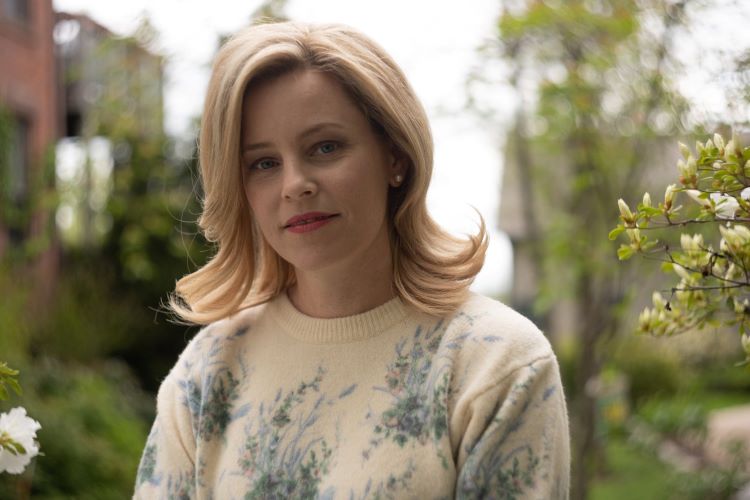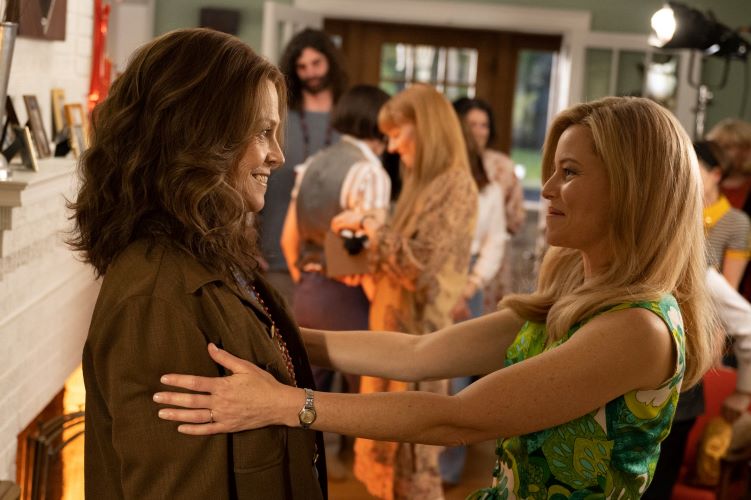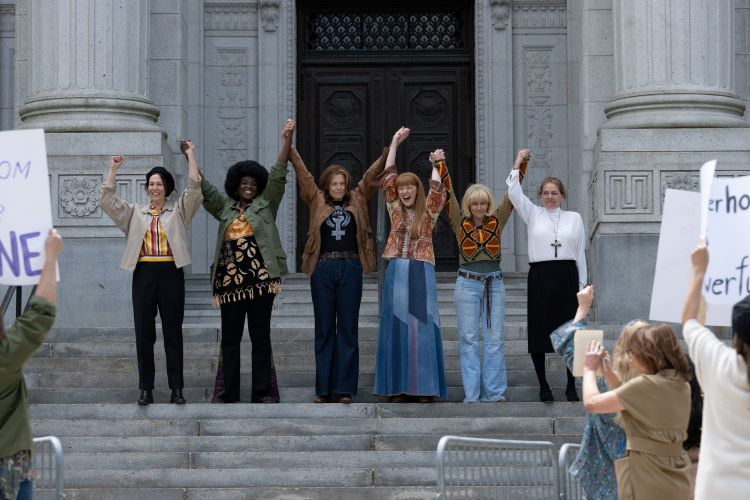
It could be you. That is the most powerful message conveyed by Call Jane, directed by Phyllis Nagy, a film that takes on the issue of abortion, at a time when women’s right to choose is once more in danger. The film is based on the activities of the Jane Collective, a group of women in Chicago who worked to help women who needed abortions during the years 1968 – 1973, when abortion was illegal in Illinois. The screenplay by Hayley Schore and Roshan Sethi focalizes the narrative through the fictional character of Joy (Elizabeth Banks), a loving wife, mother of a 15-year-old daughter, and a woman of faith, who is happily pregnant once more, until she learns that due to a heart condition, continuing the pregnancy to term will endanger her life. By deliberately creating a protagonist who is college-educated, married, religious, and a mother, a woman who is content in her role as a homemaker, is neither an activist nor a feminist and is fairly conservative politically, a woman who is perhaps the kind of person who might be opposed to abortion, Call Jane invites the complacent crowd to consider – it could happen to anyone, it could be me, I could be caught in that situation, needing an abortion, and not able to get one.
The film opens with a dramatic scene that conveys the spirit of the time – 1968 – while also emphasizing Joy’s distance from much of the action in those turbulent times. The Democratic National Convention took place in Chicago at that time, and in Grant Park, opposite the Hilton Hotel, about 10,000 Yippie demonstrators gathered, and were met by twice as many police and National Guardsmen, and lots of tear gas. Joy (Elizabeth Banks) is first seen on her way to a lavish party in honor of her husband Will (Chris Messina) and others who have just been promoted in a big law firm. As she approaches the party in her evening gown, her blond hair in an elaborate upsweep, Joy is drawn by the noise and excitement outside. She steps out, where she is stopped by the police officer and told to stand back. She hears the protesters chant: “The whole world is watching.” Later, a police officer is seen brutally beating a protester. The words stay with her, igniting a new awareness.
Elizabeth Banks has some stellar comic roles to her credit – Effie Trinket in The Hunger Games, Gail Abernathy-McKadden in the Pitch Perfect films, Zack and Miri Make a Porno, and many more – and she brings a wonderful depth and credibility to her portrayal of Joy. Phyllis Nagy, who wrote the screenplay for Carol, introduces Joy and her world at a leisurely pace, revealing a woman who is happy with her life, in love with her husband, and devoted to her teenage daughter Charlotte (Grace Edwards). Theirs is a traditional home, typical of many in the 60s – Will goes off to work in the morning and comes home to a clean house and a delicious home-cooked meal. She does not appear to pursue a career, studies, or a hobby that reflects her own interests, yet there is more to Joy than cooking and cleaning. She’s curious, and open to new things – wandering through Charlotte’s bedroom, Joy looks at the posters and records, selecting a record by the Velvet Underground. She’s also smart, something Will knows and appreciates, asking her to look over a brief he has written.
Pregnant with her much-anticipated second child, when Joy learns that due to a heart condition the only way to save her life would be by terminating the pregnancy – her life is turned upside down. She does not want an abortion, but she does not want to die. Contending with this situation reveals Joy’s inner strength and resilience, which is almost like a muscle that has not been in use for many years. She has the naivete and insecurity fostered by years of a comfortable, yet narrow life in which she has not had to deal with a wider world. Determined to survive, she must now overcome the obstacles set by the laws governing abortion at the time. Petitioning the hospital board for an emergency abortion, she arrives at the meeting with a platter of cookies, like any well-mannered guest. But when the all-male cohort of doctors talk about the favorable chances of Joy delivering a healthy baby, talking around her as if she was not there, she pushes back and speaks up. But to no avail, the board votes no.
Joy’s plight is representative of women in the United States at the time, although her situation was many times better than women of color, and women without her financial resources. A medically approved abortion was difficult to the point of being almost impossible to obtain, those who were refused, like Joy, had no legal recourse. Illegal abortions were mostly under the auspices of the Mob, and were not only expensive, but conducted under conditions that were dangerous in themselves. This part of the film is fascinating as Banks depicts Joy’s response to her tragic circumstances, and conveys her trajectory with a nuanced, very genuine performance. The story and activities of the Jane Collective are told through Joy’s experiences, and through her, the viewer comes to know the collective, its members, and the problems with which they contend. The character of Joy is, in many ways, a composite of some of the real-life members of the Jane Collective, and the experiences described in the film – as shocking and surprising as they are (if you want a spoiler, scroll down), accurately reflect the true events of the time. As in the film, the group was primarily white, and the issues of racial inequity are addressed in the film through the character of Gwen, with a strong performance by Wunmi Mosaku.

As Joy is drawn in to the collective, she blossoms, discovering forgotten and hidden abilities, excited by the feeling of doing something important, and nurtured by the feeling of community. This works well in the first two thirds or so of the film, as a protagonist with a dramatic narrative invites empathy and generates suspense. However, the tight focus on Joy, and her central role in the collective, somewhat diminishes the film’s power, especially when it is compared to The Janes, the documentary directed by Tia Lessin and Emma Pildes featuring interviews with many former members of the collective. At a time when abortion was illegal, these women risked arrest and almost certain jail time to help other women in need. They trusted one another, and the women who needed abortions trusted them. The story of the Jane Collective is not about one heroic woman, it is about a community of heroic women working together. Sigourney Weaver is magnificent as always in her role as Virginia, the pragmatic and wily leader of the group, but other than Virginia and Gwen, the other women in the group are just faces in the crowd. I would have liked to get to know them better.

Spoiler Warning
XXXXXXXXXXXXXXXXXXXXXXXXXXXXXXXXXXXXXXXXXXXXXXXXXXXXXXXXXXX
The doctor they work with is not a medical doctor. This, incredibly, was also true of “Mike” who performed abortions for the Jane Collective and is interviewed in the film The Janes.





